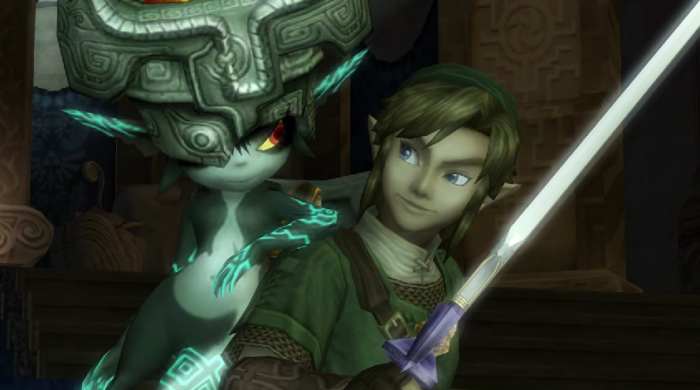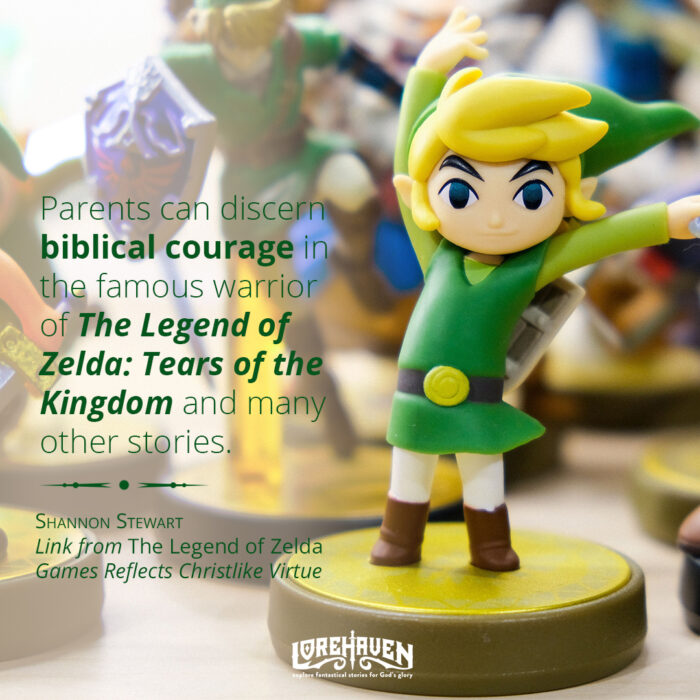Link from ‘The Legend of Zelda’ Games Reflects Christlike Virtue
My household has entered a new stage where every child’s question about a story we’ve enjoyed together is “Who was your favorite character?” At lunches and dinners, I have the opportunity to learn each child’s first, second, third, and fourth favorite character in Oliver & Company (1988), as well as the least favorite, second-to-least favorite, and third-from-least favorite.
With all these rankings, it was probably inevitable that after we as a family finished the game The Legend of Zelda: Twilight Princess, my eldest asked me, “Who’s your favorite version of Link?”
I’ve been a dedicated Zelda fan since I first played Ocarina of Time (1998) at age twelve, so I actually contemplated this question for some time. It turns out that it’s hard to pick a favorite Link, the sword-wielding hero of the Legend of Zelda games. And since Link was originally designed (even by virtue of his name) to be a direct connection from players to games—more a cipher than a character—one might even argue whether choosing a favorite Link is appropriate.
However, as the console Zelda games have developed in scope, so too have the Links’ personalities. Does that mean I was, in the end, able to pick a favorite? No. But each Link does tend to excel in something especially heroic and praiseworthy.
If you’re a parent of budding gamers like me, it’s worth your time to discern the common grace truths in video games like these, starting conversations (however small) with your children. We call this incarnational parenting because we’re entering into our children’s worlds, not only to enjoy stories alongside them but to use those moments to point to Christian virtue and God’s goodness.1
Let’s explore some of my favorite qualities of the primary-console versions of Link since Ocarina of Time.
Ocarina of Time (1998) and Majora’s Mask (2000)
Ocarina of Time’s Link (1998) stands out from the others because of the thanklessness of his task. He begins as an outcast: raised as a Kokiri, he is actually a Hylian, so he never fits in with either culture. He loses/skips seven formative years of his life, surrendering his childhood to his country’s need. Or, in an alternate timeline2, Link gets sent back to regain his lost time, but loses the fruits of his difficult labors and all the relationships he’s developed as the world’s hero. This guy can’t win—or at least, can’t enjoy the fruit of winning. He began as an outsider from his people, and ends an outsider even from his own time.
Majora’s Mask (2000) has Link searching for one of those lost relationships, making a slew of other friends who immediately either forget him because of more time-traveling tomfoolery, or don’t notice at the end when he slips quietly out of the land he’s just saved.
This Link does what is right, despite the cost, with no thought of thanks or glory for himself. He spends his life serving people who seem oblivious to his presence and sacrifices. In these ways he reflects the Suffering Servant, rejected by men and with no place to lay his head.
Wind Waker (2002)
This Link is most remarkable because he does not set out on his quest with any sense of grand destiny.3 He is not identified from the start as the chosen one on whom the fate of the world hangs. No, this Link becomes embroiled in the epic conflict because he’s a big brother. And he will not let the hugeness of his opponents, the impossible vastness of the ocean, or his own small size dissuade him from rescuing his kidnapped little sister.
Zelda fans are so used to Link being a servant of destiny that it’s difficult to recall that his trials during the first half of the game—giant monsters, active volcanoes, unsympathetic pirates, hostile fortresses—are, for him, only steps to increase his chances of saving his sister. In this way, he’s like our True Elder Brother, who stops at nothing to get us safely under His care.
 Twilight Princess (2006)
Twilight Princess (2006)
We meet this Link as a goat-herding farmer. He’s rather put-upon by the other youths in the village, who all take advantage of his patient good nature. Soon after, the imp-like Midna also decides to use Link to her advantage.
I love this Link most for being a catalyst character; his dependable good nature and his quiet faithfulness end up changing everyone around him. The village kids find inspiration and backbone from his fearless example. Midna’s character arc from user to sacrificial hero is one of the best in the series, and it’s a result of her silently witnessing (and eventually benefiting from) Link’s steady and uncomplaining goodness. Like Christ, our hero’s seeming moral perfection is not off-putting, but growth-producing, as other characters watch him meekly and courageously shoulder their burdens.
Skyward Sword (2011)
Very similar to the Twilight Princess hero, this Link wins even the town bully over to his side without a word of opposition or complaint. However, my personal favorite virtue about this Link is what the Zeltik points out in his “Top 5 Best Link Moments” video: as the first Link, he sets the precedent for all other Links’ unflinching courage. The evil entity Demise describes how all mortals hide and cringe away from him—all while Link stands before him, sword drawn, listening. Not running. Not hiding. He’s the first mortal ever to stand up to Demise, even as Demise makes a whole speech about how no one can stand against him.
In a series where all Links are defined primarily by their courage, this Link steadily listening to Demise is an excellent emblem of all the Links to come—and of the true and better David, facing His people’s ruthless enemy with a face set like flint.
Breath of the Wild (2017)
Breath of the Wild’s Link is a great successor to all the Links before him. Beginning at an almost laughable disadvantage, this Link goes through superhuman trials, all to save someone he can’t remember, for a country that feels almost too far gone to bother with. Without his memory, how can he have a personal stake like a little sister or a love interest? Yet he immediately takes on his task—not because he can see what he’ll get out of it, but because it is right. In this way, he follows in the footsteps of the Second Adam, who willingly surrendered His rights to do what was good for a people who felt too far gone to save.
All these versions of Link illustrate a Christlike martial warrior
All these Links have one common link: they do what is necessary, no matter how impossible the odds or scarce the rewards. I can’t help but recall C. S. Lewis’s phrase, “Necessity’s son.”4 In context, this epithet refers to Mars, the Roman god of war. To be sure, Mars’ association with battle and bloodshed gives him many vices. But for Lewis and the medieval Christians who influenced him, Mars was also a rich spiritual symbol of certain excellencies awakened and embodied by the one true God: “Discipline—obedience—faithfulness—strength—growth”5
Link represents the noble qualities of Mars, and Mars is an imperfect shadow of the ultimate knight, Christ, the hero we all need. When we play Zelda games incarnationally with our kids, let’s remind them of this most excellent hero.
- We as a family imbibed this idea from The Pop Culture Parent (2020) from New Growth Press. ↩
- Technically this version of Link creates the Zelda multiverse. ↩
- See “Top 5 Best Link Moments (The Legend of Zelda),” Zeltik on YouTube, Oct. 31, 2019 (slight language warning). ↩
- C. S. Lewis, “The Planets,” quoted in Michael Ward’s Planet Narnia, Oxford University Press (2008), page 78. ↩
- Ibid., 99. If you wonder why Christians should draw inspiration from classical mythology, check out Planet Narnia—or the more accessible Narnia Code, also by Michael Ward. ↩





























As a dedicated Link fan, this article makes me extremely happy and I completely agree with all your points. I’m a big believer in each individual Link having their own personality and character mostly separate from the player (made even more evident by the absolute menace players are being in TOTK which the story knows nothing of 🤣), but you’re right, it’s REALLY hard to choose a favorite! Wild and Sky are probably tied for me? Prooobably?